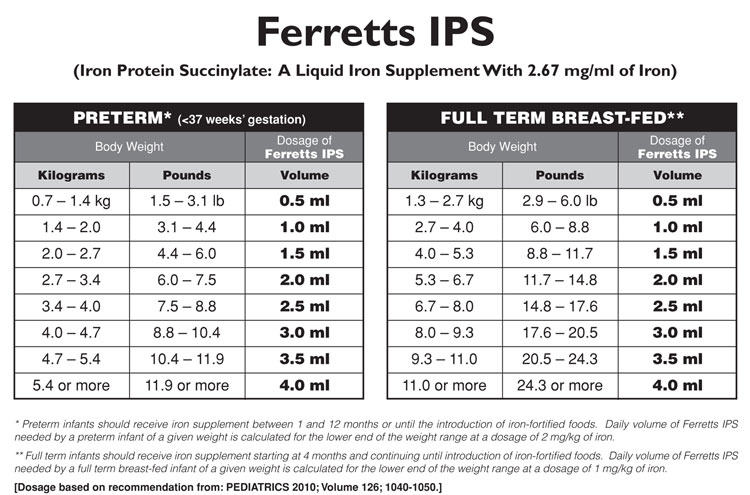To order click here
Iron Deficiency in Infants and Toddlers and Possible Consequences.
 – Of all nutrient deficiencies, iron deficiency is the most common and is especially prevalent in infants and toddlers.
– Of all nutrient deficiencies, iron deficiency is the most common and is especially prevalent in infants and toddlers.
– Iron deficiency and iron deficiency anemia in infants may adversely affect long-term neurodevelopment and behavior; some of these effects may be irreversible.
– Studies confirm that iron deficiency anemia increases lead absorption; therefore, prevention of iron deficiency anemia might also serve as to reduce the likelihood of lead poisoning.
– Infants between 6 and 12 months have an RDA for iron of 11 mg/day.
Term, healthy infants have sufficient iron for the first 4 months of life
–Breastfed term infants at 4 months of age need 1 mg/kg per day of oral iron as a liquid supplement until appropriate iron-containing foods are introduced into the diet.
– Partially breastfed term infants receive more than half of their feedings as human milk and do not receive supplementary iron-containing food. At 4 months of age, these infants need 1 mg/kg per day of oral iron as a liquid supplement until iron containing foods are introduced.
– Formula-fed term infants do not typically need iron supplementation for the first 12 months because of the iron content of most infant formulas.
IRON DEFICIENCY IN INFANTS AND TODDLERS
– Preterm infants (in a full term newborn infant is accumulated during the 3rd trimester of pregnancy. As a result, premature infants miss this rapid iron accumulation. Estimation of the iron requirement for preterm infants can only be approximate (i.e., 2-4 mg/kg per day).
– Breastfed preterm infants should receive a supplement of elemental iron of 2 mg/kg per day from 1 month of age through 12 months of age or until the infant is either weaned to a formula which is iron-fortified or begins eating foods that provide 2 mg/kg per day of iron.
– Formula-fed preterm infants typically receive about 2 mg/kg per day of iron from a standard infant formula and most will typically not need iron supplementation. However 14% of preterm formula-fed infants between 4 and 8 months of age will require iron supplementation; the amount needed varies between infants.
RDAs for Toddlers and Children.
– Toddlers 1 to 3 years of age have a RDA for iron of 7 mg/day as a liquid supplement. *If Ferretts IPS, our liquid iron supplement is used, then 2.50 ml per day would provide sufficient iron*.
– Children 4 to 8 years of age have an RDA of 10 mg per day. *If Ferretts IPS, our liquid iron supplement is used, then 3.50 ml per day would provide sufficient iron.*
Ferretts IPS has a unique delivery mechanism for better tolerability and absorption - it's also non-constipating. Ferretts IPS is non-soluble in the acidic environment of the stomach thus completely bypasses the stomach without exposing the iron to the gastric mucosa. 93.7% of patients reported NO adverse reactions. You to can Feel the Difference! Click here to learn more
*Based on recommendation from: Baker, RD, Greer, FR, and The Committee on Nutrition of the American Academy of Pediatrics. PEDIATRICS 2010; Volume 126; 1040-1050. Diagnosis and Prevention of Iron Deficiency and Iron-Deficiency Anemia in Infants and Young Children (0-3 Years of Age). Online Address:http://www.pediatrics.org/cgi/content/full/126/5/1040 and also from “Dietary Reference Intakes”, Food & Nutrition Board, Inst. of Med., National Academies of Science; available online at http://iom.edu/Activities/Nutrition/SummaryDRIs/~/media/Files/
Activity%20Files/Nutrition/DRIs/RDA%20and%20AIs_Vitamin%20and%20Elements.pdf)
Ferretts IPS is Better Tolerated for Better Results. To order click here
Check with your physician before taking an iron supplement or giving an iron supplement to a child.
*WARNING: Accidental overdose of iron containing products is a leading cause of fatal poisoning in children under 6. Keep iron containing products out of the reach of children. In case of accidental overdose, call a doctor or poison control center immediately.
Statements on this page have not been evaluated by the Food and Drug Administration. These products are not intended to diagnose, treat, cure or prevent any disease.
